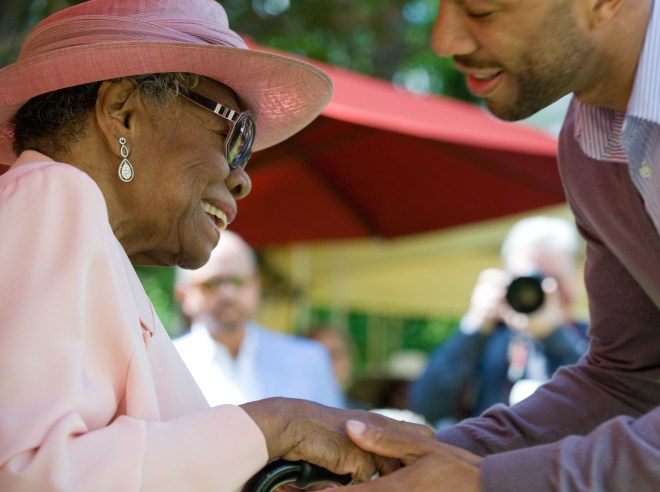Ronda Racha Penrice pays homage:
[For Angelou,] a poet, memoirist, dancer, singer, actress, playwright, producer, director, teacher, civil rights activist and women’s rights advocate, there were no limits to her outlets for creative expression or her capacity to champion justice and equality. Her life was a testament to the power of possibility as well as an affirmation of courage and daring.
Emma Brown captures the sweep of that life:
As a child growing up in the Jim Crow South, Maya Angelou was raped by her mother’s boyfriend; as a young woman, she worked briefly as a brothel madam and a prostitute. From those roots in powerlessness and violence, she rose to international recognition as a writer known for her frank chronicles of personal history and a performer instantly identified by her regal presence and rich, honeyed voice.
From her desperate early years, Ms. Angelou gradually moved into nightclub dancing and from there began a career in the arts that spanned more than 60 years. She sang cabaret and calypso, danced with Alvin Ailey, acted on Broadway, directed for film and television and wrote more than 30 books, including poetry, essays and, responding to the public’s appetite for her life story, six autobiographies. She won three Grammy Awards for spoken-word recordings of her poetry and prose and was invited by President-elect Bill Clinton to read an original poem at his first inauguration in 1993, making her only the second poet in history, after Robert Frost, to be so honored.
As Margalit Fox notes, Angelou never intended to be known for her autobiography:
[S]he remained best known for her memoirs, a striking fact in that she had never set out to be a memoirist. Near the end of “A Song Flung Up to Heaven,” Ms. Angelou recalls her response when Robert Loomis, who would become her longtime editor at Random House, first asked her to write an autobiography. She demurred at first, still planning to be a playwright and poet. Cannily, Mr. Loomis called her again. “You may be right not to attempt autobiography, because it is nearly impossible to write autobiography as literature,” he said. “Almost impossible.”
“I’ll start tomorrow,” Ms. Angelou replied.
The effects of that decision are still being felt:
Joanne Braxton, a professor at the College of William and Mary, says Angelou’s willingness to reveal the sexual abuse she suffered as a child in I Know Why the Caged Bird Sings was unprecedented at the time. The critical acclaim and popularity of the book opened doors for both African-American and female writers. “Maya Angelou brought about a paradigm shift in American literature and culture,” Braxton says, “so that the works, the gifts, the talents of women writers, including women writers of color, could be brought to the foreground and appreciated. She created an audience by her stunning example.”
In addition to being a poet, author, artist, teacher, and activist, Angelou was a prolific tweeter. Evan McMurry is struck by her final message:
This tweet, sent five days ago, may be Angelou’s final public statement after seven decades of them:
Listen to yourself and in that quietude you might hear the voice of God.
— Maya Angelou (@DrMayaAngelou) May 23, 2014
For a writer who so transformed her own experiences into an autobiographical art at once personal and communal – those 400K followers were there for a reason – that tweet could serve as an epitaph.
(Photo: Poet Dr. Maya Angelou and musician Common attend Angelou’s 82nd birthday party with friends and family at her home in Winston-Salem, North Carolina on May 20, 2010. By Steve Exum/Getty Images)
Update from a reader:
Beyond Angelou’s poetry and prose, she had an uncanny ability to focus compassion for others, and in this case, for one’s self that I’ll also remember about her. You can see the impact it had on Dave, not to mention Tupac:
Iconoclasts: Maya Angelou and Dave Chappelle from DERTV on Vimeo.
